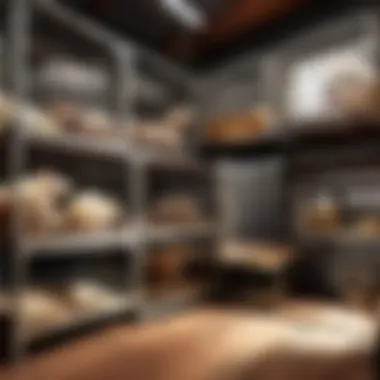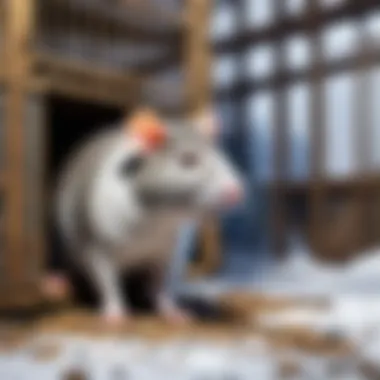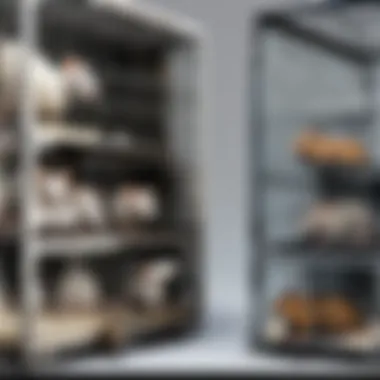Finding the Right Rat Cage: A Comprehensive Guide


Intro
Choosing the right cage for your pet rat requires careful consideration. This guide aims to provide clarity on what to look for when selecting a suitable habitat for your rodent companion. Understanding your rat's needs is essential for ensuring their health and well-being. This discussion delves into factors such as size, materials, and features to create a comfortable living environment.
Rats are sociable creatures that require an adequate space to thrive. They enjoy climbing and exploring, which means that their cage should cater to their natural behaviors. This guide will help both new and seasoned rat owners to navigate the complexities of finding the right cage while focusing on key considerations that guarantee accessibility and safety.
Key Considerations in Selecting a Rat Cage
Several critical factors should guide your choice. The major elements include geographical considerations, specific size requirements based on rat breed or number, cage materials, as well as essential features that promote rat welfare.
- Accessibility: Ensure that the cage can easily be cleaned, accessed for feeding, and provide safe handling of your pets.
- Safety Measures: Consider the spacing between bars to avoid escape and ensure it’s chew-proof to maintain integrity over time.
- Comfort Features: Look for options that allow for enrichment, such as multiple levels, hammocks, and toys.
Keeping these considerations in mind helps foster a happy, healthy home for your rats.
Moving forward, we will explore various aspects of rat cages, detailing everything you need to know to make an informed decision.
Preface to Rat Cages
Selecting the right rat cage is fundamental for both the physical and psychological well-being of your pet rats. Rats are social creatures that need proper space, stimulation, and comfort in their habitat. A well-chosen cage satisfies their natural behaviors and instincts. This article will help you navigate through the complexities of picking the most suitable rat cage, ensuring your furry companions thrive.
Understanding the Importance of Proper Housing
Proper housing is paramount for rat health and happiness. An inadequate cage can lead to stress and behavioral issues in rats. It can affect their mood, increase aggression, or even shorten their lifespan. Proper housing also prevents illnesses that can arise from unsanitary conditions filled with waste.
Factors such as the size of the cage, the materials used, and the layout contribute critically to creating a suitable environment. Owners must understand that rats need space to run, climb, and explore. Comprehending these requirements is vital when choosing a cage. Investing in the right housing not only ensures their comfort but also fosters a deeper bond between you and your pets.
Overview of Available Cage Types
When it comes to rat cages, there are several types available, each with distinct features, advantages, and disadvantages. Understanding these options can guide your decision-making.
- Wire Cages: These are popular due to their excellent ventilation. Wire cages typically have multiple levels, which increase vertical space for climbing. However, the bar spacing must be small enough to prevent escapes.
- Plastic Cages: Plastic cages often offer a more enclosed environment. They are usually easy to clean and less prone to rust. However, they may lack ventilation and can get smelly quickly without regular upkeep.
- Glass Aquariums: Although typically used for fish, glass aquariums can be an interesting option. They provide a clear view for observing your pets, but they must be carefully monitored for airflow and humidity.
- Modular Cages: These cages allow for customization and expansion. They are often a combination of materials and provide flexibility for owners looking to create a unique habitat. However, they can be costly and require more maintenance.
- Travel Cages: For occasions when you need to move your rats, travel cages can be used. They are not ideal for permanent housing but are convenient for short stays or vet visits.
Factors Influencing Cage Selection
When selecting a rat cage, it is crucial to consider various influences that will impact your choice. A suitable rat home is much more than just a container; it plays a significant role in the well-being and health of your pets. Here we will dissect critical factors to help you make informed decisions.
Space Considerations for Your Rats
Single vs.
Group Housing
Choosing between single and group housing for rats is an essential decision. Individual rats often benefit from having their own space. This setup allows for less competition for resources and can reduce stress levels. On the other hand, rats are social creatures and thrive in groups. Group housing fosters natural behaviors and social interactions, which are critical for their mental health. However, it is necessary to ensure the cage is large enough to accommodate their needs without overcrowding.
One key characteristic is that group housing requires a more spacious environment. This feature leads to better overall health for the inhabitants. Choosing group housing can encourage play and social bonding but should be monitored for any aggressive behavior, especially among unspayed females.
Vertical Space Needs
Vertical space needs are another vital aspect to consider. Rats are active and love climbing. A cage with multiple levels allows them to engage in natural climbing behavior, reducing boredom and promoting physical activity. Adding vertical elements can be beneficial and improve the overall habitat quality.
The unique feature of having vertical space is the stimulation it provides. Cages that include shelves, ramps, or hammocks encourage rats to explore their environment. However, if vertical space is not adequately designed, it may lead to falls, which can result in injuries. Therefore, it is essential to ensure that the materials and design are safe and sturdy.
Material Quality and Safety


Metal vs.
Plastic Cages
The choice between metal and plastic cages significantly impacts durability and safety. Metal cages usually are more sturdy and easier to clean than plastic cages. They are less prone to chewing, a common habit among rats. However, metal cages can be heavier and sometimes more expensive.
Plastic cages, while lightweight and often cheaper, may not endure as long in active environments. Key characteristics of plastic include being easier to set up and transport, but their longevity is questionable when compared to metal options. Furthermore, many rats may chew on plastic, leading to possible health risks.
Non-Toxic Coatings
Non-toxic coatings on rat cages are necessary for safety. These coatings offer protection against rust and damage, which can lead to sharp edges that pose a risk to your pets. Non-toxic finishes ensure that your rats will not come into contact with harmful substances that can impair their health.
The main benefit of non-toxic coatings is the added safety they provide. Ensuring there are no toxic materials improves confidence among rat owners, knowing their pets are safe. Features to watch for include certifications or clear labels assuring the absence of harmful chemicals.
Accessibility and Size of Entry Points
The accessibility of the cage and the size of entry points is often overlooked. A cage must have entry points that are big enough for easy access yet small enough to keep your rats secure. Ease of access is helpful for cleaning, feeding, and interacting with your pets.
If sizes are mismatched, it can lead to difficulty in handling or changes in the rats’ behavior. Ensuring that you can adequately access all parts of the cage may lead to better care for your pets and ensure that they remain comfortable in their habitat.
Remember, a well-chosen cage can greatly improve the quality of life for your rats.
Where to Buy Rat Cages Nearby
Choosing the right place to buy a rat cage is vital for ensuring that your pets are well accommodated. The location impacts many elements, such as price, availability, and quality of service. Rat owners must understand the options available, ranging from local pet stores to online retailers. Each channel has distinct advantages and drawbacks, affecting the overall shopping experience.
Local Pet Stores vs.
Online Retailers
When deciding between local pet stores and online options, it's important to evaluate their unique characteristics. Each has pros and cons that can influence your choice as a rat owner.
Pros and Cons of Local Purchases
Shopping at local pet stores offers immediate access to products. You can physically inspect the cage and verify its condition before purchase. This tactile experience is particularly useful when it comes to checking the quality of construction and materials used.
However, local stores may have a limited selection. Depending on your area, finding a specific type of rat cage may not be possible. Prices could also be higher due to overhead costs.
Key Characteristics:
- Immediate access to products
- Ability to inspect the cage firsthand
- Potentially higher prices
Online Shopping Tips
Online retail offers a much broader variety of options. Sites like Amazon or Chewy provide access to numerous brands and designs, allowing for more tailored choices. Price comparisons are easier online, and sales can often provide good deals.
Nevertheless, one must consider potential downsides. Shipping times can be lengthy, and it's harder to assess quality without seeing the cage in person. Also, there’s the risk of receiving damaged goods.
Key Characteristics:
- Wider selection of cages
- Easier price comparison
- Risk of long shipping times and damaged goods
Using Local Listings and Directories


Utilizing local listings and directories can significantly enhance your search for a suitable rat cage. These tools help to uncover lesser-known shops and new retailers that may not be immediately visible.
Community Resources
Community resources can take many forms, from neighborhood bulletin boards to local online forums. Engaging with these platforms provides insights into where others buy their pet supplies. Positive recommendations can lead to discovering stores that have good quality cages at reasonable prices.
Key Characteristics:
- Insight from fellow pet owners
- Ability to find local, often hidden stores
- Community-oriented recommendations
Yelp and Google Maps Functions
Yelp and Google Maps can be invaluable tools in the search for rat cages. They provide reviews and ratings of local establishments, assisting you in making an informed choice. With location search features, it’s easy to identify nearby pet stores quickly.
Key Characteristics:
- Access to user-generated reviews
- Location-based search aids
- Quick identification of stores nearby
Using these modern tools enhances the search process, ensuring you find the most suitable cage for your pet.
Evaluating Cage Features
Evaluating the features of a rat cage is a crucial step in ensuring the well-being and comfort of your pet. A suitable habitat is not merely a matter of size or aesthetics; it deeply influences the rats' quality of life. Key features play a significant role in their health, activity levels and overall happiness. Let's explore essential features that should be considered when choosing a cage.
Ventilation and Airflow
Proper ventilation is vital for maintaining a healthy environment inside the rat cage. Rats are susceptible to respiratory issues, often caused by stale air or a buildup of waste gases. A cage with adequate airflow helps to minimize these risks. Aspects to consider include the size and number of vents. Look for cages designed with an open structure and materials that allow air to circulate freely. Good airflow aids in treating odors and keeping the environment fresh.
Removable Trays for Easy Cleaning
Cleaning is an essential part of rat ownership. A cage with removable trays simplifies this process significantly. The ability to detach and clean trays makes it easier to maintain hygiene. Look for cages with features like non-stick surfaces that reduce the effort required for scrubbing. This not only helps in keeping the cage tidy but also promotes a healthier habitat by preventing the accumulation of waste.
Accessories That Enhance Living Conditions
Climbing Structures
Providing climbing structures is vital for your rats' physical and mental stimulation. Rats are natural climbers, and structures that allow them to explore vertically add enrichment to their environment. Key aspects of climbing structures include safety materials, supporting multiple rats, and non-slip surfaces. Their ability to promote exercise and exploration makes them a beneficial addition to any rat's habitat. However, ensure that these structures are securely placed to prevent accidents during play.
Hiding Spots
Rats require hiding spots to feel secure and reduce stress. These spaces grant them a sense of privacy, especially when they are feeling shy or threatened. Look for cages that come equipped with built-in hiding compartments, or consider adding your own. Materials like soft fabrics or untreated wood are suitable for this purpose. Hiding spots can enhance the overall emotional health of your pets, but be sure they are easily accessible for cleaning.
In summary, evaluating the features of your rat cage involves looking beyond the surface. Consider ventilation, ease of cleaning, and significant accessories like climbing structures and hiding spots. These elements contribute to your rats' comfort, safety, and happiness. A well-designed cage can make a significant difference in their lives.
Common Mistakes in Cage Selection
Selecting a cage for your rats is not a trivial task. Many first-time owners often overlook critical aspects that affect the health and happiness of their pets. Understanding common mistakes during the selection process can help prevent issues that arise later. It is essential to take the time to consider each factor carefully. Making informed choices leads to a habitat that supports their well-being.
Ignoring Size Requirements
Size is a crucial element in selecting the right cage. Rats need enough space to move around, explore, and play. Ignoring size requirements can lead to stress and aggression among your pets. Generally, larger cages are preferred, especially if housing multiple rats. Think about the following factors:
- Single vs. Group Housing: If you have a single rat, a smaller cage might suffice. However, for more than one, opt for larger spaces to avoid territorial disputes.
- Vertical Space Needs: Rats are natural climbers. Cages that offer vertical space allow them to climb and engage in normal behaviors, which is essential for their mental health.


A good rule of thumb is to ensure that the cage is at least 30 inches tall and provides enough floor space for them to live comfortably.
Choosing Unventilated or Inadequate Materials
The material and ventilation of the cage play a significant role in the overall comfort and safety of your rats. Choosing a cage that is poorly ventilated can lead to health issues, such as respiratory problems. Essential points to consider include:
- Metal vs. Plastic Cages: Metal cages are generally better for ventilation and longevity. Plastic cages can be more challenging to clean and may harbor bacteria, leading to health risks.
- Non-Toxic Coatings: Ensure any materials used are safe and free from harmful substances. Toxic materials can cause severe health problems for rats, so invest in quality cages crafted from safe materials.
Ventilation should be adequate to ensure fresh air circulation, reducing the risk of mold and odors that can affect your pets.
Neglecting to Consider Rat Behavior
Rats exhibit a wide range of natural behaviors that need to be accommodated in their living environment. Neglecting to consider these behaviors while selecting their cage leads to boredom and unhappiness. Here’s why behavior matters:
- Social Interaction: Rats are social animals. Providing a larger cage with accessories like tunnels and platforms can enhance their engagement and improve their quality of life.
- Enrichment Opportunities: Incorporating toys and hiding spots is vital. A cage that is too bare reduces opportunities for exploration and mental stimulation.
By considering their behavior, you create a more comfortable and enjoyable habitat that promotes overall health.
Maintaining a Comfortable Habitat
Maintaining an ideal habitat for your pet rats is essential for their wellbeing and longevity. A comfortable living environment supports their physical health and promotes positive behavior. When selecting a rat cage, attention to cleanliness and environmental conditions plays a critical role in sustaining a thriving ecosystem for your pets. Regular attention to these aspects leads to happier, healthier rats and a better experience for the owner.
Regular Cleaning Routines
Regular cleaning routines are vital to ensuring a hygienic living space for your rats. Accumulation of waste can lead to unpleasant odors, which is not only bothersome but can also affect the health of the rodents. Establish a cleaning schedule that is consistent, such as weekly deep cleans and daily spot checks.
During routine cleaning, consider these key practices:
- Remove soiled bedding and waste regularly to prevent bacteria growth.
- Wash the cage with mild, non-toxic cleaners to eliminate germs and maintain surface integrity.
- Inspect and clean accessories like food dishes and water bottles, which can harbor harmful substances if not maintained.
- Rotate toys and enrichments to provide a stimulating environment while also allowing for cleaning.
Consistency in these practices not only improves the habitat but also enhances the bond you have with your pets, providing them the attention and interaction they require.
Temperature and Humidity Controls
Controlling the temperature and humidity levels in your rats’ habitat is another critical factor for their comfort. Rats are sensitive to extreme temperature changes and can become stressed in conditions that are either too hot or too cold. Ensuring a stable environment encourages a more relaxed and social behavior.
Key considerations include:
- Ideal temperature ranges between 68°F and 72°F (20°C to 22°C). Use a thermometer to monitor the environment.
- Humidity levels should ideally remain between 40% to 60%. High humidity can lead to respiratory issues, while low humidity can dry out their skin and fur. Utilize a hygrometer to check conditions regularly.
- Ventilation should also be adequate. Ensure that air circulation within the cage is unobstructed, as stagnant air can lead to poor air quality.
By maintaining proper temperature and humidity levels, you create a nurturing habitat that respects your rats' needs and promotes their overall health and grooming habits.
End
Selecting the right cage for your rats is essential. It directly affects their health and happiness. An appropriate cage creates an environment where your pets can thrive. When choosing a cage, many factors come into play, including size, material, and essential features. Each of these aspects contributes to the overall welfare of your rats.
Summary of Key Considerations
When considering a cage, reflect on the following key points:
- Size: Adequate space is crucial for movement and activity. It ensures comfort.
- Material Quality: Choose safe, non-toxic materials. Metal cages often provide better durability compared to plastic options.
- Ventilation: Proper airflow prevents humidity buildup, which can lead to health problems.
- Accessibility: Ensure your rats can enter and exit easily. Cleaning and maintaining the cage should also be manageable for you.
These elements are foundational for creating a sanctuary for your rats. Ignoring any of them can lead to issues, either for you or your pets.
Final Thoughts on Choosing the Right Cage
Choosing the right rat cage requires thoughtful consideration of various factors. Each rat has unique needs. Therefore, the ideal cage may differ based on individual circumstances. Take the time to assess your options. It might also help to interact with fellow pet owners to gather insights about their experiences.
In summary, investing time in selecting a cage pays off. The right habitat enhances the quality of life for your rats. A well-chosen cage contributes to both their well-being and your satisfaction as an owner. Make your selection carefully, and your companions will thank you.



